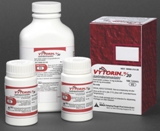There was good news and bad news for Merck/Schering-Plough following their release of long-delayed and disappointing data from the ENHANCE trial, which found no advantage for Vytorin over simvastatin in retarding the progress of atherosclerosis.
On the upside, two prominent organizations of heart specialists came to the drug’s defense. On the downside, congressional investigators smell something fishy and promise to pry further.
The American Heart Association and the American College of Cardiology each released statements downplaying the study results – the ACC release bearing the subhead “Don’t panic and talk with your physician.” The ACC said that while deserving of follow-up, the ENHANCE study “is an imaging study and not a clinical outcome study,” and advised that major clinical decisions not be made on that basis alone.
Furthermore, the group recommended “that Zetia remain a reasonable option for patients who are currently on a high dose statin but have not reached their lipid goals.”
Similarly, the AHA advised that “the study was not large enough or long enough to determine whether the combination drug is more or less effective than (simvastatin alone) in reducing heart attacks or deaths.”
The groups’ wait-and-see stances contrast sharply with remarks by Cleveland Clinic’s Dr. Steven Nissen, who made the rounds of news media advising that Zetia and Vytorin both be relegated to last-resort status.
Meanwhile, House committee baron John Dingell and Rep. Bart Stupak (both D-MI) sent a letter to Merck and Schering-Plough advising them that their Committee on Energy and Commerce and Subcommittee on Oversight and Investigations are looking into the “withholding of clinical trial data that may significantly affect the medical management of hypercholesterolemia, as well as the use of misleading statements in direct-to-consumer advertisements for prescription medicines.”
Reps. Dingell and Stupak vowed to examine “the apparent manipulation of the study’s endpoints” and the joint venture’s exclusion of primary investigator Dr. John Kastelein from an outside advisory panel they convened.
They also signaled a focus on Vytorin advertising, demanding records related to Vytorin ads and asserting that “given the frequency of Vytorin advertisements, it concerns us that a study showing that Vytorin provides no increased benefit was not issued for nearly two years while direct-to-consumer advertisements were carried on the airwaves. This situation raises concerns that the drug companies and their advertisement agencies profited at the significant expense of patients’ health.”
Analysts were generally sanguine about the prospects for the franchise. In a note to investors on Schering-Plough following the release of the ENHANCE data, Standard & Poor’s noted that the data reaffirmed an LDL-lowering advantage for Vytorin and said that while they had downgraded Schering-Plough to “Buy” from “Strong Buy” for concern over impending Congressional meddling, “We think more promising results are likely from larger outcomes studies involving 20,000 patients to be released in March.”







